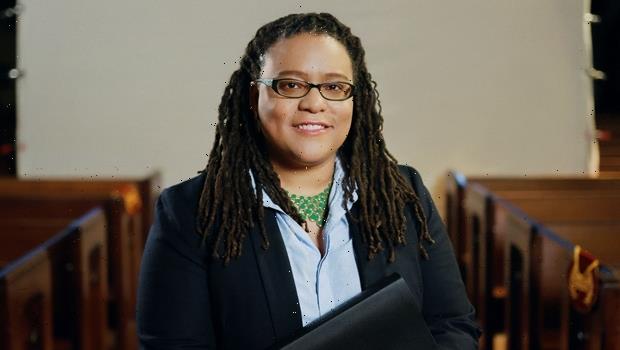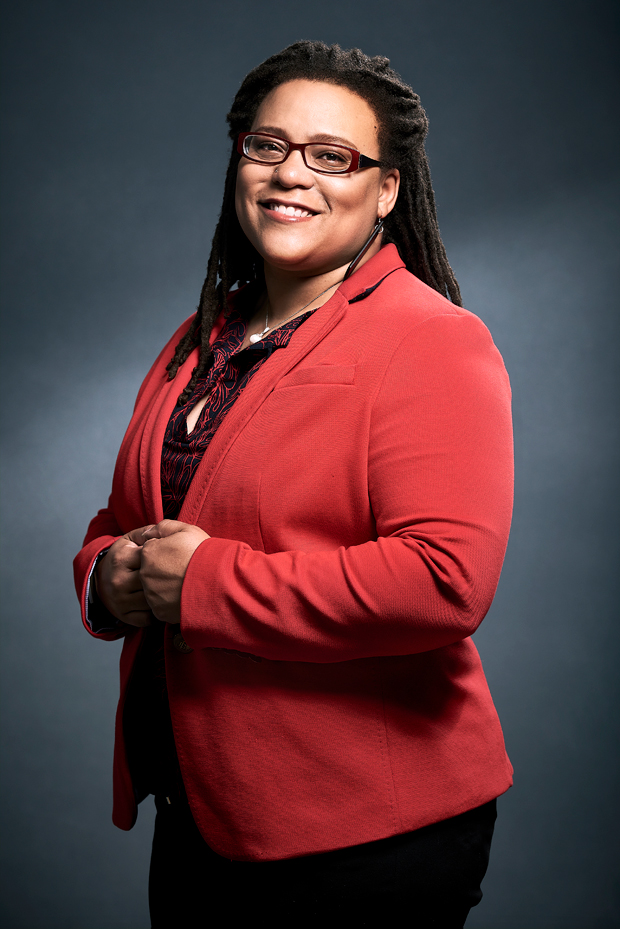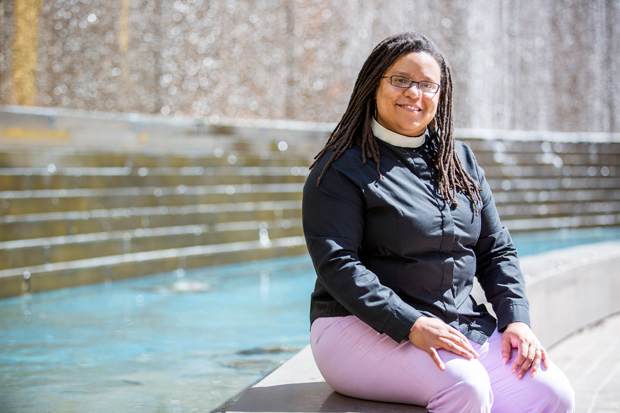‘This isn’t your grandmother’s Georgia anymore.’ These are the words of Kim Jackson, who believes that none of the state’s new voter suppression laws will stop other progressives from getting elected there.
When Kim Jackson was growing up in a “one-stoplight town”, she never imagined that one day she would become the first queer state Senator in Georgia. But after her surprise win in a fairly conservative Georgia district in the 2020 elections, the reaction of one young woman from her former high school encapsulated for her why it was so important that she had run for office and succeeded.
The young woman “direct messaged me after my election and she said, ‘You know, I go to the high school you graduated from and it’s really homophobic even now. But seeing you get elected let me know that maybe something good can come out of our town, cause you did!’”
“I will always hold that message close to my heart”, Jackson told HollywoodLife in an exclusive interview. “Because I do think it exemplifies what so many young folks who come from places like I come from needed to see… I’m very grateful to be a hope bearer in that way for so many people.”
Jackson, who is also Black, is a hope bearer, especially since she managed to get elected in a Georgia district that is deeply religiously diverse. She succeeded she explains, through a very hands-on campaign of getting together with her voters at meet and greets in their homes two or three nights a week before the pandemic. Then in numerous zoom meetings once Covid hit the country.
Kim, who is also an ordained minister, loved meeting the people that she would represent and talking to them about the issues that were important to them.
“It’s my job to sit in person with people and ask questions. That’s what gives me energy”, she enthuses.
But she absolutely believes that her election as a Black queer woman – along with the election of two Democratic senators, Ralphael Warnock and Jon Ossoff – and with President Joe Biden winning the state, “symbolizes that Georgia is not your grandmother’s Georgia.”
“So many people just have kind of written off Georgia as this kind of country place where white straight men are going to be the people who get to run this country and run the state. My election proved otherwise,” she confidently asserts. “Georgia is very capable and willing to elect an out Black queer woman. And while I may be the first, I won’t be the last.”
Good to hear her prediction, especially after Georgia, became infamously the first state to pass sweeping voter suppression and potentially voter nullification laws after the state “turned blue” in the 2020 election. Clearly, the white Republican men who had traditionally run the state were terrified by the prospect of losing their grip on power at the highest levels of the state government and they were determined to prevent that from happening again. It didn’t help that former President Trump pleaded in a phone call with Georgia Secretary of State, Brad Raffensperger, to somehow “find” him over 11,000 votes (that didn’t exist) so he could take Georgia’s Electoral College votes away from Biden and have them awarded to himself.
When Jackson was elected she thought she would be focused on passing legislation to improve the lives of families and women, in her district and state. “It’s really similar to how I came to do ministry. I felt very much called to make people’s lives a little better,” she recounts. In fact, she decided to run for the Senate after working with a group of other women to get legislation passed to get a huge backlog of rape kits in Georgia tested as evidence in rape cases.
“Tears were streaming down my face,” she remembers. However, she never expected that once elected, she would be spending her first months in office fighting Georgia’s proposed new laws that would ensure that Black, minority, disabled and young people would find it much harder to vote in the state.
The new laws make it harder to vote by mail, to absentee vote, to use drop boxes for ballots and could shorten voting hours, close polling stations, and consolidate voting districts. It makes it illegal to provide free water and food to people waiting in lines, often for hours, to vote. As well and even more egregious than this, they could even allow the Republicans to overturn the results of Georgia district and state elections if they don’t like them.
Jackson found herself fighting tooth and nail along with her other fellow Democrats in the Republican-dominated Legislature to at least get rid of the worst of the worst of the new laws, like a ban on Sunday voting which took direct aim at Black voters who historically voted in groups after attending church. She takes comfort in the fact that the final bill wasn’t as bad as it was originally.
“As a Black American in the South, anytime people make it more difficult for us to vote, we cannot help but remember the people who come before us, who literally bled and died trying to get access to the ballot”, she asserts. “I feel like I am carrying on the work of our ancestors and I stand in that legacy of making sure that we secure access to the ballot for everyone. I receive energy and hope from that legacy.”
Jackson talks about the steep hurdles that Black Americans have had to overcome historically in Southern states in order to cast their ballots, and yet they did overcome them. “There was a time when we had to open up literacy schools to teach people how to read so they could be able to vote because that was the requirement… and to teach people about the Constitution so they could pass these poll tests,” she points out. “So if we have to go inside buildings to get to drop boxes, these are hurdles that we are primed to jump over. Because we’ve already done things that were much more difficult.”
If Georgia Governor Brian Kemp and his Republican lawmakers think that by changing voting rules and restricting access to the polls that they will be able to retain total control of Georgia’s government, then he is seriously wrong according to Jackson. “They changed the rules because we were winning and we will keep winning”, she insists. “Georgia is increasingly a blue state. We will register more and more people to vote and we will get these folks to the polls”, she insists. “We will focus on educating people on how they can still go vote and making sure they know exactly where to go.”
Jackson explains that yes she is working with Stacey Abrams‘ organization, Fair Fight, which has been responsible along with other progressive activist groups for registering thousands of minority and young voters to vote in Georgia’s elections and to educate them about how to do it. They will push forward on this work despite Georgia’s new laws, which also elicited widespread criticism from Atlanta-based corporations like Coca-Cola and Delta.
She believes that Kemp and the state Republicans have actually hurt, not helped themselves. “I think the laws have energized people. You know, it’s like when somebody hurts you. It makes you mad and you get right back up and fight. People will be going back to the ballot box out of revenge.”
Because of this, this first-time lawmaker is optimistic that Democrats will win all the state-wide elections in 2022, including the Governorship. Will Stacey Abrams run for governor again after losing in a very tight race in 2018? “We all hope, pray and believe that Stacey will be running for governor”, she responds. And will she win? “Absolutely, absolutely,” insists Jackson.
She also predicts that Raphael Warnock will be re-elected to his Senate seat, despite all the opposition efforts. But in the meantime, a determined Jackson has been working hard and across the aisle, to make life better and safer for her constituents. She succeeded in driving a bill into law that allows women to get out of their leases if they are being stalked. “It was really important for me to accomplish this because it will save women’s lives… if we can get women to safety, if we can get women out of the place where their stalker knows they live and they can have a fresh start, then we can save their lives”, she tells Hollywoodlife.
Jackson’s next priority is to get a bill passed that enables people who are victims of sexual assault, to get a protective order. Currently, you can only get one in Georgia if you are a victim of domestic violence (in other words, your assaulter is your domestic partner ), or you can get one if you are being stalked. But, if the person who assaults you isn’t your domestic partner (they could be someone that you dated casually or just knew), then you can’t get a restraining order. You fall through the cracks. Jackson wants to stop that.
And yes, she worked with Republicans to get her law allowing the breaking of a lease passed, and now she is working with one who will co-sign her protective order bill. “You can’t pass a bill in Georgia without Republicans”, she says matter-of-factly. She has also worked with Republicans on a criminal justice reform bill. “We’re able to find places where Republicans and Democrats can come together on issues like women’s safety and adoptions ,which are originating in the foster care system.
Not surprisingly, Jackson is proud that despite her position as a Democrat – the minority party in the state’s Senate and House of Representatives – she has been able to make positive change. And she hasn’t encountered any hostility or pushback from her Republican colleagues about the fact that she is queer. “My colleagues will say to me, ‘oh I know, I found out that you’re gay’ and they whisper the word ‘gay’. And then they are very quick to say ‘I’m cool about it’”, she recounts. “And it is often an opening for legislators to say to me ‘oh, you know my daughter is like you.’”
She believes that it’s because there are Republican colleagues who do have sons and daughters “like her”, that some “pretty terrible bills” that would have prevented same-sex couples from adopting, as well as a bill banning trans kids from participating in sports, have all quietly died.
Jackson may be the first Black female LGBT state senator in Georgia, but there are four others across the country. And what her success tells her is that others like her and other young women, in general, can run and get elected into political offices, despite what they think are long odds.
“I’m living proof that you can do it”, she tells HollywoodLife. When she began to think about running for office, she initially thought that she should wait 20 years, until she was older, but her mom stepped in and told her “why do something when you’re old when you can do it when you’re young?” Her advice pushed her to take the step to do what she felt “called” to do.
Then she received encouragement and concrete help from a progressive organization called Run For Something that gives training to progressive candidates running for political office at the state and local levels. “They were the very first organization to endorse me – they were the first to believe in me – a young Black woman who had never run for office”, she enthuses. “They gave me training and an advisor to talk through strategy. They really helped me as a first-time candidate.” She encourages other young progressives who are considering running for office to contact Run For Something. Or, if you would like to donate to Run For Something, click here.
Her other advice to aspiring political candidates counsels Jackson, who has been married to her partner for 10 years, is to “surround yourself with people who believe in you and will remind you that you can do it, when you may not believe in yourself.”
Jackson definitely listened, and look where she is now.
Source: Read Full Article




